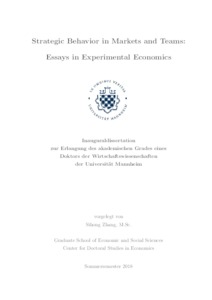|
Strategic behavior in markets and teams : essays in experimental economics
Zhang, Sihong
![[img]](https://madoc.bib.uni-mannheim.de/45820/1.hassmallThumbnailVersion/Dissertation_SihongZhang.pdf)  Vorschau |
|
PDF
Dissertation_SihongZhang.pdf
- Veröffentlichte Version
Download (2MB)
|
|
URL:
|
https://madoc.bib.uni-mannheim.de/45820
|
|
URN:
|
urn:nbn:de:bsz:180-madoc-458204
|
|
Dokumenttyp:
|
Dissertation
|
|
Erscheinungsjahr:
|
2018
|
|
Ort der Veröffentlichung:
|
Mannheim
|
|
Hochschule:
|
Universität Mannheim
|
|
Gutachter:
|
Orzen, Henrik
|
|
Datum der mündl. Prüfung:
|
7 Juli 2018
|
|
Sprache der Veröffentlichung:
|
Englisch
|
|
Einrichtung:
|
Fakultät für Rechtswissenschaft und Volkswirtschaftslehre > VWL, Verhaltensökonomik (Juniorprofessur) (Pencynski 2011-2017)
Fakultät für Rechtswissenschaft und Volkswirtschaftslehre > Experimentelle Wirtschaftsforschung (Orzen 2009-)
Außerfakultäre Einrichtungen > GESS - CDSE (VWL)
|
|
Lizenz:
|
 Creative Commons Namensnennung 4.0 International (CC BY 4.0)
Creative Commons Namensnennung 4.0 International (CC BY 4.0)
|
|
Fachgebiet:
|
330 Wirtschaft
|
|
Normierte Schlagwörter (SWD):
|
Experimentelle Ökonomik , strategische Interaktion , Informationsaustausch , Marktdynamik , Teamwork
|
|
Freie Schlagwörter (Englisch):
|
experimental economics, strategic interaction, information disclosure, market dynamics, procrastination, team work
|
|
Abstract:
|
In classical economics the baseline assumption when analyzing the strategic behavior and performance of firms and individuals is that decision-makers are completely rational and selfish (focused on maximizing their own payoff). While this assumption is a useful theoretical benchmark, it do not always apply to peoples behavior in reality. Human beings are often only partially rational, which may lead to unsophisticated and inefficient decisions.
In the three self-contained chapters of this dissertation, I analyze strategic decisionmaking
and the dynamics of markets and teams using laboratory experiments. Chapter 2, which is based on joint work with Stefan Penczynski, investigates how much information sellers are willing to disclose under competition and whether consumers make sophisticated buying decisions in the sense that they can draw the right conclusions from the information that is and is not provided to them. Chapter 3, which is based on
joint work with Henrik Orzen, considers only the firm side and analyzes the assumption that due to competition and market dynamics only rational firms that decide optimally in terms of profit maximization survive in the long-run. Chapter 3 tackles the question
of the validity of laboratory experiments in our market setting. In Chapter 4 I examine dynamic investment behavior in a teamwork setting where investments have to be accumulated over time to complete a certain project. I seek to analyze whether there is cooperative behavior even if collective interests conflict with individual interests as costs are private and benefits are public.
|
 | Dieser Eintrag ist Teil der Universitätsbibliographie. |
 | Das Dokument wird vom Publikationsserver der Universitätsbibliothek Mannheim bereitgestellt. |
 Suche Autoren in Suche Autoren in
Sie haben einen Fehler gefunden? Teilen Sie uns Ihren Korrekturwunsch bitte hier mit: E-Mail
Actions (login required)
 |
Eintrag anzeigen |
|
|
